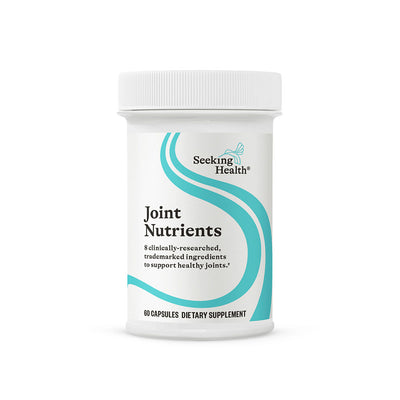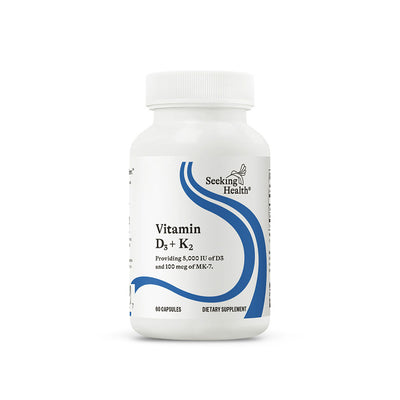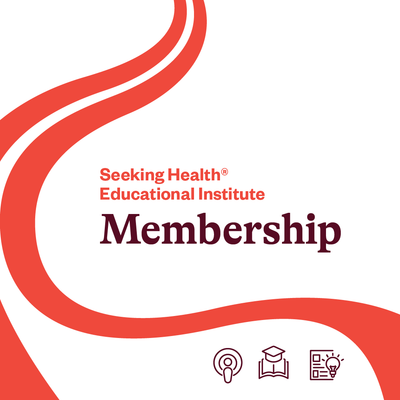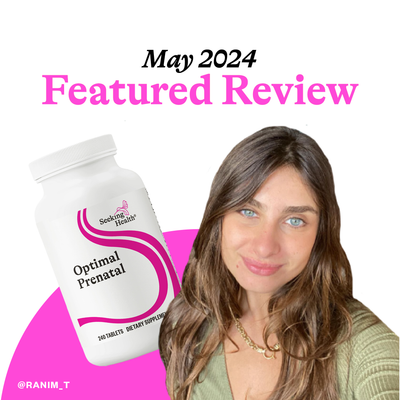In general, becoming a parent takes a lot of planning. You must ensure you can financially and emotionally support a child and are healthy. Sadly, pregnancy may still elude you no matter how much you’ve prepared and how badly you want it. You may find yourself among the 17.5% worldwide who experience problems with fertility(1) after one or more years of trying. After all the effort you’ve put in, this can be devastating.
The good news is that you can take steps to support a healthy pregnancy. A prenatal vitamin may help support ovulation and fertility. Your healthcare practitioner will likely want you to start one at the first mention of trying to conceive. These vitamins are generally safe. They can help reverse vitamin deficiencies and support your health and well-being. Once you're pregnant, they can also support a healthy pregnancy and healthy fetal development.†
Learn more about how prenatal vitamins can bolster your health and pave the way toward a successful pregnancy. You can also learn about other things you can do to increase your chances of making your dreams of parenthood come true.
Do Prenatal Vitamins Increase Fertility?

Some prenatal vitamins may help support healthy fertility. In fact, even the regular multivitamin you may take daily can help.(2) However, a prenatal has vitamins and nutrients that specifically support pregnancy long before you conceive. Some may even help support healthy ovulation.†
You can speak with your healthcare professional to make sure your prenatal contains the following:
| Nutrient | Benefit |
| Folate | Increasing folate intake for at least 12 weeks may support healthy fertility.(3)† |
| Niacin | Supplements containing niacin may support healthy ovulation, especially if you have polycystic ovary syndrome (PCOS).(4)† |
| Vitamin E | Taking a prenatal with vitamin E can support normal ovarian volum and follicular health(5,6)† |
| Vitamin D | While more study needs to happen, adequate Vitamin D levels could play a role in healthy fertility and endometrial health. It may be worth speaking to your healthcare practitioner about including Vitamin D in your prenatal regime.(7) |
| Iron | Iron intake may benefit your ability to get pregnant if you risk becoming iron-deficient.(8) However, there doesn’t seem to be a connection between iron and fertility in general. Talk to your healthcare professional to see if you are at risk and need to include an iron supplement with your prenatal. |
How Long Does It Take For Prenatal Vitamins To Start Working?

There’s no way to tell how fast a prenatal vitamin will start working - they don't work like that. It's something you take to supplement what you eat and other healthy habits that may lead to pregnancy. While that can be hard to hear, it makes it even more critical for you to talk to your healthcare practitioner early. You'll want to do everything you can to boost your chances of conceiving and prepare for a healthy pregnancy.
Some experts suggest that all reproductive-age women take a prenatal if they can tolerate one.(10) This can help if you become pregnant unexpectedly. As you learned earlier, taking folate may support healthy fertility. If you're not taking one already, you may want to start taking a prenatal several months before you try to conceive.†
How Can I Support My Fertility When Trying To Get Pregnant?

First, if you have any underlying health conditions, talk to your healthcare practitioner for treatment. Then, consider adding a prenatal. Finally, there are several other steps you can take to help support your fertility and chances of getting pregnant:
- Eat a healthy diet. Foods with a high glycemic index and high in saturated and trans fats can also negatively impact fertility.(11) Eating a healthy diet rich in nutrients may help your ability to conceive, especially if you have PCOS. For example, following the Mediterranean diet can help you get healthy, which may help fertility.(12) It can help reduce inflammation and reduce oxidative stress.
- Take your antioxidants. Antioxidants have been shown to support ovulation in healthy women.(13) These include retinol, tocopherol, lutein, lycopene, and beta-carotene. However, don’t start including any in your diet until you speak with your healthcare professional to avoid potential adverse reactions.†
- Maintain healthy body weight. Obesity is linked to the inability to become pregnant and many health complications that can be avoided.(14) But, women who are obese and who lose an adequate amount of weight before conception increase the chances of pregnancy.(15)
- Reduce the stress in your life. You may know someone who got themselves so stressed over getting pregnant that they didn’t — until they stopped trying! The effects of ongoing stress can build up in your body, affecting your hormones and, potentially, fertility.(16) Speak with your healthcare practitioner about ways you can lower your stress levels. Speak with your healthcare practitioner about ways you can lower your stress levels. This may include exercise, mindfulness and meditation, yoga, biofeedback, and journaling.(17)
- Quit smoking. What else is there to say? It isn’t good for so many aspects of your life. Once you have a baby, consider the excellent example you’ll set!
- Ask your healthcare practitioner if you may have an MTHFR mutation. If you have an MTHFR mutation, you can’t process folic acid as well as well as you should be able to. It may be worth you and your partner investigating if you’ve been trying to get pregnant for some time. Taking 5-MTHF can help with the methylation process so your body can properly use folate.(18)†
- Watch your alcohol consumption. Heavy alcohol consumption may decrease your ovarian reserve and your ability to get pregnant as soon as you may like.(19) While there is no conclusive evidence about the effects of light to moderate drinking on fertility, it is still worthwhile to consider stopping if you’re trying to conceive.
- Avoid drinking soft drinks: Caffeinated soft drinks can increase your chances of experiencing ovulatory disorder infertility.(20) The same goes for noncaffeinated, sugared, diet soft drinks in general. If you need some bubbly, stick to unsweetened mineral or sparkling water. There are a lot of delicious and thirst-quenching choices these days!
Seeking Health’s Prenatal Vitamins
If you’re ready to start taking prenatal vitamins, you can check out the prenatal vitamins and supplements Seeking Health has developed to help support you throughout your pregnancy. You can take these supplements from when you first try getting pregnant until after delivery. We’ve also included methyl-sensitive formulas if you experience side effects from taking traditional supplements.
None of the supplements in our prenatal collection contain iron. This allows you to customize your iron intake as your healthcare practitioner advises which may be more gentle on your body.
The Bottom Line

If you're finding getting pregnant difficult, speak with your healthcare professional. They will likely suggest taking a prenatal if you aren't already. Nutrients in these supplements, like folate and vitamin E, may support healthy ovulation and fertility. They can also help support your and your baby's health once you conceive. You can choose from several prenatal vitamins Seeking Health offers to help you welcome a new life into the world.†
Remember, though, patience is critical. It may still take you a while to get pregnant, even if you take a prenatal. You can also make other lifestyle changes to increase your chances of pregnancy. This includes quitting smoking, drinking alcohol, and avoiding sugary soft drinks. It also includes reducing the stress in your life and eating healthy foods. Practicing healthy habits, taking supplements, and addressing any preexisting health conditions can give you the best chance of becoming pregnant.
References
- https://www.who.int/news/item/04-04-2023-1-in-6-people-globally-affected-by-infertility#:~:text=Around%2017.5%25%20of%20the%20adult,care%20for%20those%20in%20need.
- https://pubmed.ncbi.nlm.nih.gov/22302137/
- https://pubmed.ncbi.nlm.nih.gov/17211965/
- https://pubmed.ncbi.nlm.nih.gov/33751926/
- https://pubmed.ncbi.nlm.nih.gov/26706242/
- https://pubmed.ncbi.nlm.nih.gov/33438304/
- https://pubmed.ncbi.nlm.nih.gov/28500824/
- https://pubmed.ncbi.nlm.nih.gov/31152673/
- https://pubmed.ncbi.nlm.nih.gov/34624677/
- https://www.mayoclinic.org/healthy-lifestyle/pregnancy-week-by-week/in-depth/prenatal-vitamins/art-20046945
- https://pubmed.ncbi.nlm.nih.gov/34139003/
- https://pubmed.ncbi.nlm.nih.gov/35458118/
- https://pubmed.ncbi.nlm.nih.gov/26581679/
- https://pubmed.ncbi.nlm.nih.gov/17095518/
- https://pubmed.ncbi.nlm.nih.gov/36116799/
- https://pubmed.ncbi.nlm.nih.gov/30501641/
- https://pubmed.ncbi.nlm.nih.gov/32995736/
- https://pubmed.ncbi.nlm.nih.gov/33914208/
- https://pubmed.ncbi.nlm.nih.gov/28702207/
- https://pubmed.ncbi.nlm.nih.gov/19279491/
† These statements have not been evaluated by the Food and Drug Administration (FDA). This product is not intended to diagnose, treat, cure, or prevent any disease.











